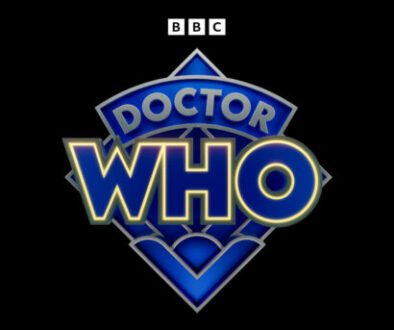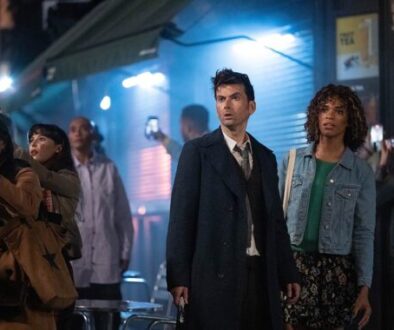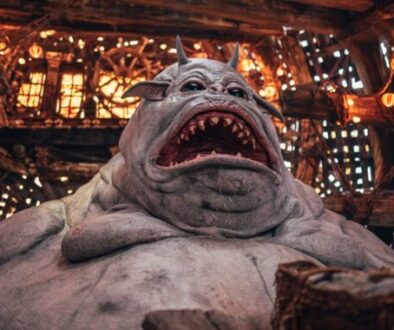2nd Opinion, Take 2 “Wild Blue Yonder” – An Improvement, But Not Really A 60th “Special”

J.C. reviews the second 60th anniversary special.
“Wild Blue Yonder” had a lot to live up to. With Russell T Davies and company releasing minimal information, even redacting scenes in trailers and cast members in magazines, the fanbase naturally went into a speculation frenzy, spawning all sorts of crazy theories that would tie into the 60th anniversary. However, the issue with that approach is that these theories were inevitably more exciting than the actual episode we got. This is not to say “Wild Blue Yonder” is a bad episode, but it is harmed somewhat by the expectations that it could never live up to, and also the fact it’s being sold as part 2 of the 60th anniversary celebrations.
It didn’t help either that the pre-title sequence set a poor first impression. It not only dissipated the tension from last week’s cliffhanger, but also seemed solely designed to set up a silly recurring gag involving a sunkissed Isaac Newton. I’ve never been a fan of Who’s flippant “let’s have a laugh at the historical figure” scenes so that didn’t help. It reminded me of Ten and Rose smugly mocking Queen Victoria. Additionally, I now wonder, will “mavity” be a recurring joke every time it’s mentioned? That’s going to get old, fast, if so.

Thankfully, the rest of the episode diverges in all respects from its pre-title segment. RTD’s episodes come in various flavours. Last week’s “The Star Beast” was his light and undemanding opener, and this week he decided to switch to “Midnight” mode (and add a dash of “The Rebel Flesh”). In a regular series, this episode would be considered a more budget-conscious one. There isn’t much complexity, there are few locations, and minimal cast. Once you remove the early obscuration, where you’re wondering what the hell is going on, there’s not a great deal to it plot-wise either. The Doctor and Donna are stuck on a ship and end up having to fight for their lives against their evil doppelgangers.
This simplicity means the episode is more of a character piece, allowing an introspective look at the Doctor and Donna. David Tennant and Catherine Tate are left to do all the heavy lifting, and thankfully they do get some strong material to play, whether as their real selves or their malevolent versions. Initially, I thought the scene where the pair were awkwardly flipping between the two rooms talking was a bad editing job, but of course, it was entirely intentional and led to one of the (if not the) best scenes in the episodes where it was revealed they were in fact both talking to doppelgangers. A spine-tingling moment.
The aforementioned scenes really kicked into gear what was quite a sluggishly paced episode up to that point. The best thing it did was add a strong sense of paranoia into proceedings, where we and our protagonists are forced to keep questioning whether they are really talking to who they/we think they were. I also liked some of the body horror imagery. Of course, it’s a shame Doctor Who can’t go far darker with this element, as the realisation often came across as more goofy than scary, but that’s always been the curse of a family show. I would’ve loved the whole thing to ramp the horror up in all respects.

Another issue is that some of the CGI really let the side down. The most notable offenders are a lot of the giant corridor sections, Tennant’s face while on his contorted body, and the chase sequence with the giant Not-Things. Doctor Who has never had a huge budget compared to other shows, but it’s bigger now than it ever has been, so there’s less of an excuse. A good chunk of the episode was done using green screen compositing, but perhaps it’s time to consider using something more akin to the StageCraft VFX being employed by the recent Star Wars shows, which allows a more natural implementation of alien environments.
Finally, those familiar with my reviews over the years know that I, along with many long-term Whovians, despise the Timeless Child retcon. I had hoped RTD would have the good sense to leave it alone, but, of course, he decided to do the exact opposite. However, credit where it’s due: Davies at least used this opportunity to bring a little more depth to the Doctor, more so than Chibnall ever did. These scenes showcased a stellar performance from Tennant, as he was forced to contemplate the aftermath of the Flux event. I’m actually pleased Davies clarified the fate of the universe, which previously remained vague as hell. It turns out “only” half of the universe is gone.
Ultimately, while I prefer “Wild Blue Yonder” over the first special, there’s still that lingering feeling that these episodes could have been something more. I think my biggest problem with these first two is that they feel a bit generic, and by that, I mean not as “special” as a 60th anniversary special should be. These still feel like episodes that would be slotted into a normal series, or Series 4.5. We’re two-thirds through the 14th Doctor’s “era” now. There is just one episode left, and it’s looking more and more likely that “The Power of the Doctor” is going to end up being more of a celebration of the 60th than all three of these specials, and that’s a little sad.
Asides
- So we finally got to see Wilf again! However, that appears to be it. Of course, it’s great to see him again, but I wanted so much more from the scene. Still, a little Wilf is better than none at all. R.I.P. Bernard Cribbins.
- Murray Gold’s score for this episode was fantastic. It felt like something very different for him and it really enhanced the atmosphere.
- The Doctor finding Isaac “hot” seems a bit of a nothingburger. I’d put this scene in the same league as throwaway bits like the Doctor saying “buy me a drink first” to Jack in “Boom Town”. Donna’s response is kinda odd though, considering she knows how much he loved Rose Tyler.
- I adored the scene of 14 using the TARDIS like a hoverboard. Eat your heart out, Marty McFly!
- I hope with “The Giggle” we’ll get something more about why the Doctor has the same face. It’s been almost entirely glossed over.








